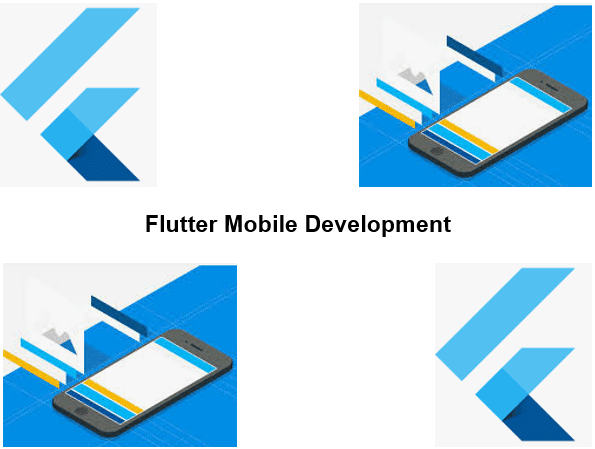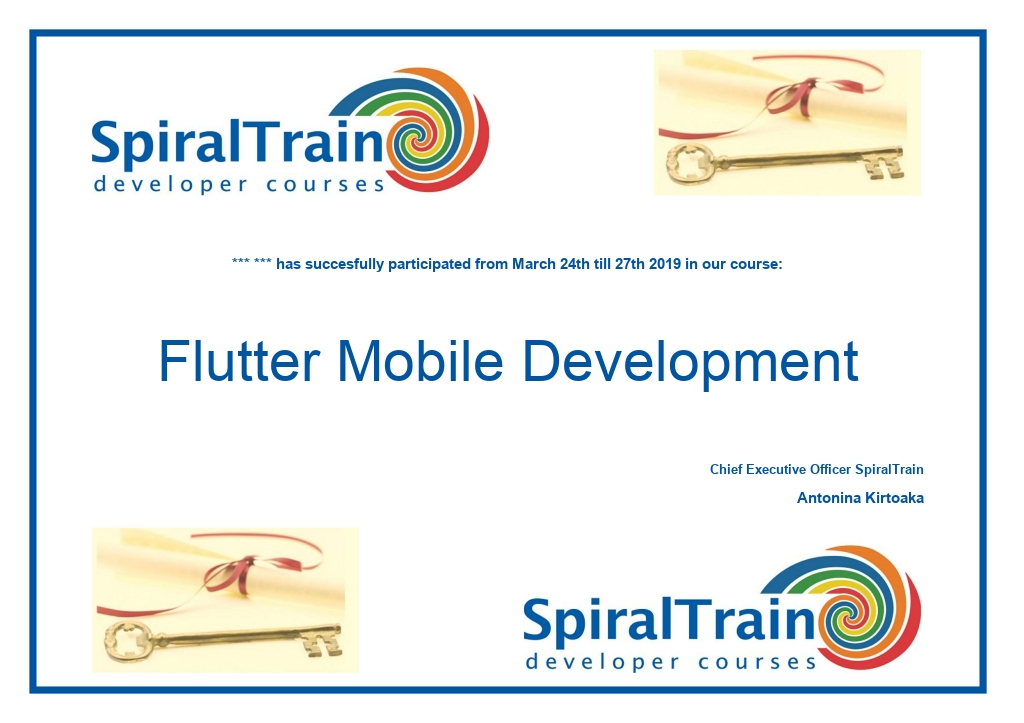-
Learning by doing
-
Trainers with practical experience
-
Classroom training
-
Detailed course material
-
Clear content description
-
Tailormade content possible
-
Training that proceeds
-
Small groups
In the course Flutter Mobile Development from SpiralTrain you will learn how to use Google's open source UI toolkit Flutter to develop mobile applications for iOS and Android in the Dart programming language. The same code base is also suitable for web and desktop applications.
The Flutter Framework comes with a large number of ready-to-use and customizable widgets that take into account all platform differences in scrolling, navigation, icons and fonts. Flutter applications are also instantly translated into native code by hot reloading with the Dart native compilers.
After an introduction to the Flutter Architecture, the Flutter SDK, Flutter packages and the Flutter package manager are discussed. The main widgets and widget composability are also treated.
Next the main features of the Dart programming language are reviewed such as data types, dynamic variables and classes and objects.
Attention is also paid to the design of the User Interface with Flutter widgets and the differences between the various types of widgets are discussed, such as stateful versus stateless widgets, container widgets, layout widgets and listener widgets.
Also important topics in the course are how Flutter applications deal with state and how navigation and routing can be implemented.
Finally attention is paid to database access. This involves accessing SQLite and Firebase databases and the usage asynchronous calls to a REST API.
The course Flutter Mobile Development is meant for developers that want to learn how to develop cross platform mobile apps with the Flutter Framework and the Dart programming language.
Programming experience in an preferable Object Oriented language is required to participate in the course Flutter Mobile Development and knowledge of Mobile App development is beneficial for understanding the concepts.
The subject matter is treated on the basis of presentation slides. Demos are used to clarify the theory. Theory and exercises are interchanged during the course. The course material is in English. The course times are from 9.30 up and to 16.30.
Participants receive an official certificate Flutter Mobile Development after successful completion of the course.

Module 1 : Flutter Intro |
Module 2 : Application Architecture |
Module 3 : Dart Language |
| Mobile Apps Platform Independence Dart Language Flutter Framework Flutter SDK Flutter Architecture Android Studio Rendering UI Flutter Widgets Reactive Programming Flutter Performance Installing Flutter Flutter Doctor |
Flutter Packages Flutter Package Manager Directory Structure Everything is a Widget Composability Feature Gestures Widget State Layers Android Layer iOS Layer Rendering Layer Flutter Native Layer Core Platform Code |
Dart Variables Data Types Numbers and Strings Lists and Maps Booleans Dynamic Variables Decision Making Loop Statements Functions Classes and Objects Constructors Fields and Methods Getters and Setters |
Module 4 : GUI Design |
Module 5 : State Management |
Module 6 : Data Access |
| Stateless Widgets Stateful Widgets Scaffolds Widget Build Visualization Platform Specific Widgets Images and Text Layout Widgets Types Single Child Widgets Container Widgets Multiple Child Widgets Gestures Types GestureDetector Listener Widgets |
Importance of State App Life Cycle Ephemeral State Application State Model and Scoped Model ScopedModelDescendant Navigation and Routing URL Patterns Pattern Matching MaterialPageRoute Navigation.push Navigation.pop Adding Animation |
Accessing Databases SQLite and Firebase sqflite Package Open Database Execute SQL Query await and Futures Advanced Queries Cloud Firestore Firebase Console Asynchronous Calls Accessing REST API's http Package Web Requests |
